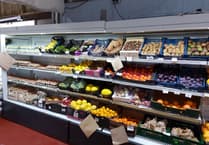Planning permission has been granted for what will be one of the biggest solar farms in Cornwall.
Renewable Connections had applied to build the solar farm and associated facilities on land near Tregonning Farm at Kestle Mill, near Newquay.
Cornwall Council’s strategic planning committee agreed to approve the plans on the condition that the council tries to reach a legal agreement with the developers to have community ownership of five per cent of the solar farm.
The committee meeting, which had been postponed just before Christmas due to poor weather, heard that the 54-hectare solar farm would be one of the largest in Cornwall and would provide enough energy for 17,000 homes.
Planning officers had recommended the application be approved saying the benefits outweighed any harm.
There had been an objection from St Newlyn East Parish Council on the basis that the development would lead to the loss of good quality agricultural land.
However, land-owner and farmer Andrew Brewer told the committee he would continue to farm the land used for the solar panels by grazing sheep there.
He said he did not believe the development of the solar farm would reduce the agricultural output of the land and claimed some studies had suggested output was actually increased on farms using solar panels due to the shelter provided for animals.
The committee heard there had been 32 objections to the application submitted to Cornwall Council along with 39 letters of support for the project.
There had been no objections from other organisations including landscape officers.
Oliver Baines, a climate change activist, spoke in objection, claiming solar power was inefficient and it would be better for land to be used for wind turbines.
He said solar was better utilised when placed on the roofs of buildings.
John Leith, development director at Renewable Connections, said the scheme was an “exemplar project” and would maximise the generation of renewable energy in Cornwall.
He said extensive work had been done to address biodiversity and ecology across the site and particular work had been done to protect and enhance skylark habitats as part of the plans.
Steve Arthur, Cornwall councillor for one of the neighbouring wards, said he was concerned about the loss of agricultural land and was not convinced that would be helped by using it for grazing sheep. He said: “Don’t let an energy crisis today turn into a food crisis tomorrow.”
Committee member John Fitter said he did not support the scheme and was concerned about the loss of “best quality” agricultural land, which he felt should be protected.
He said whilst the developers had offered to make a contribution to the local community it would be better to instead have a community ownership agreement, something which has been included in the council’s new climate change development policy which has recently been signed off by the planning inspectorate.
The committee agreed to delegate authority to planning officers with the committee chairman to grant planning permission subject to a legal section 106 agreement being reached with regards to a five per cent community ownership agreement.



.png?width=209&height=140&crop=209:145,smart&quality=75)

Comments
This article has no comments yet. Be the first to leave a comment.